Data Science Intern Resume Examples

Jul 18, 2024
|
12 min read
Turning Data Dreams into Resumes: Tips for Crafting the Perfect Data Science Intern Application
Rated by 348 people
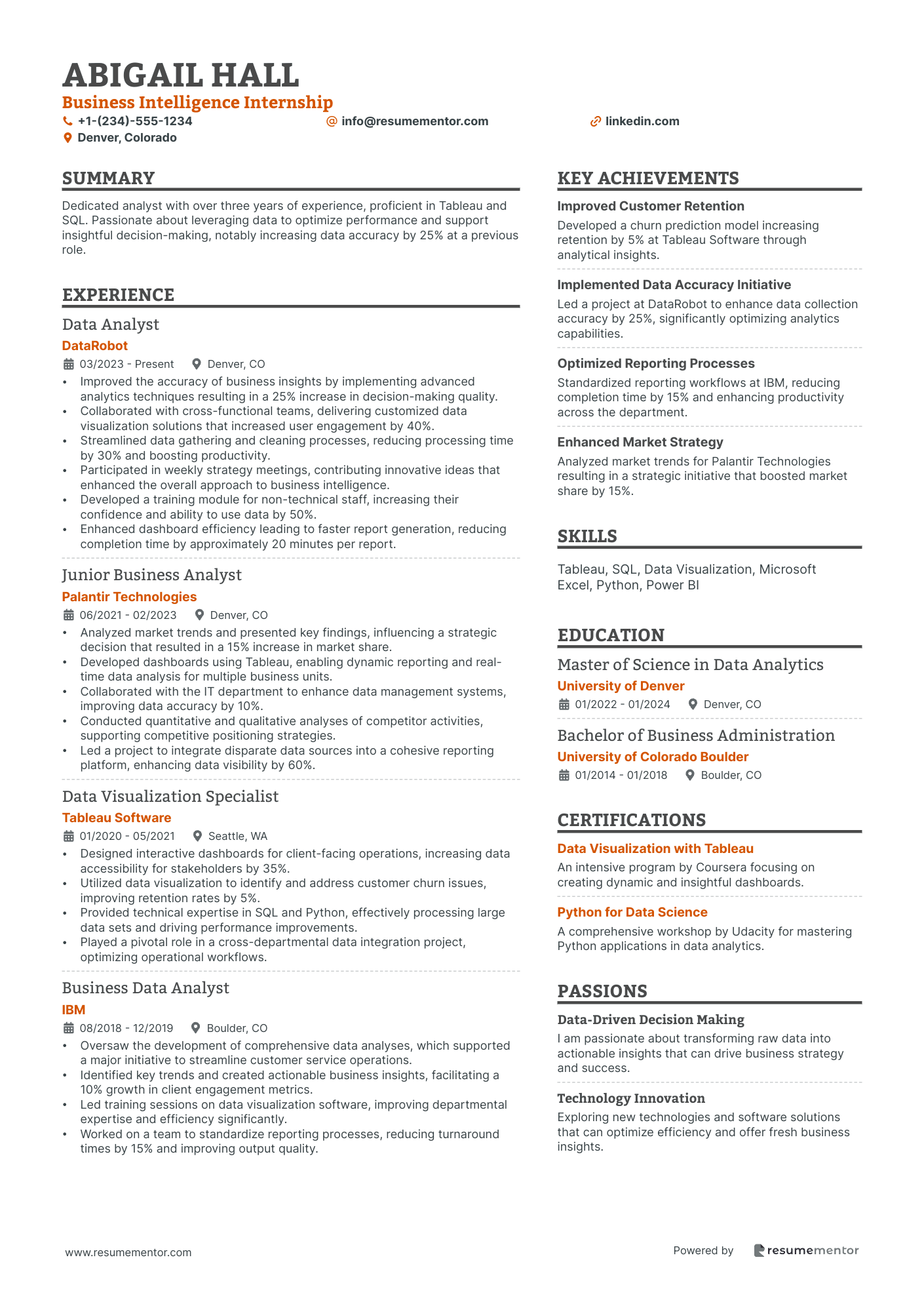
Business Intelligence Internship
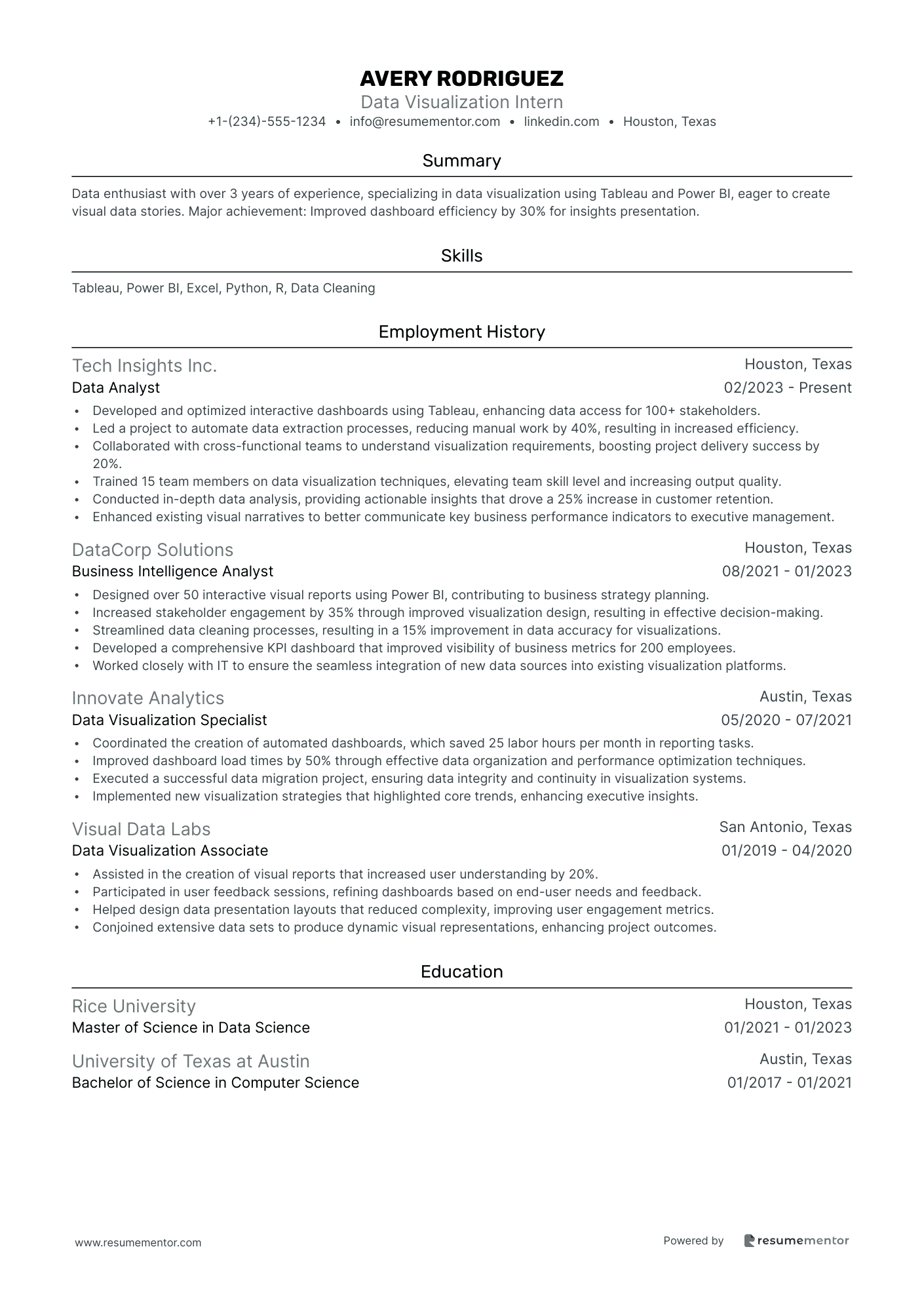
Data Visualization Intern
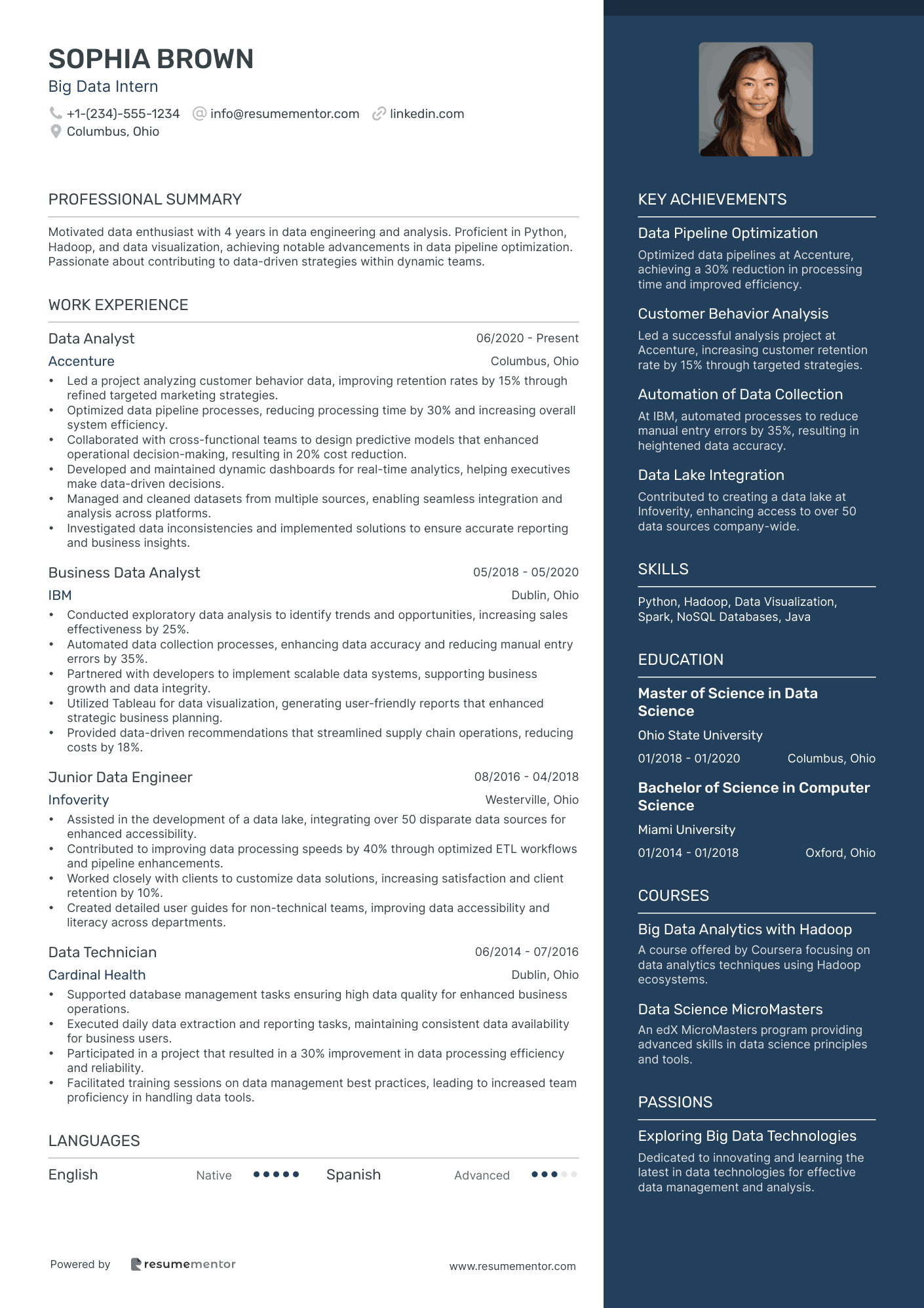
Big Data Intern
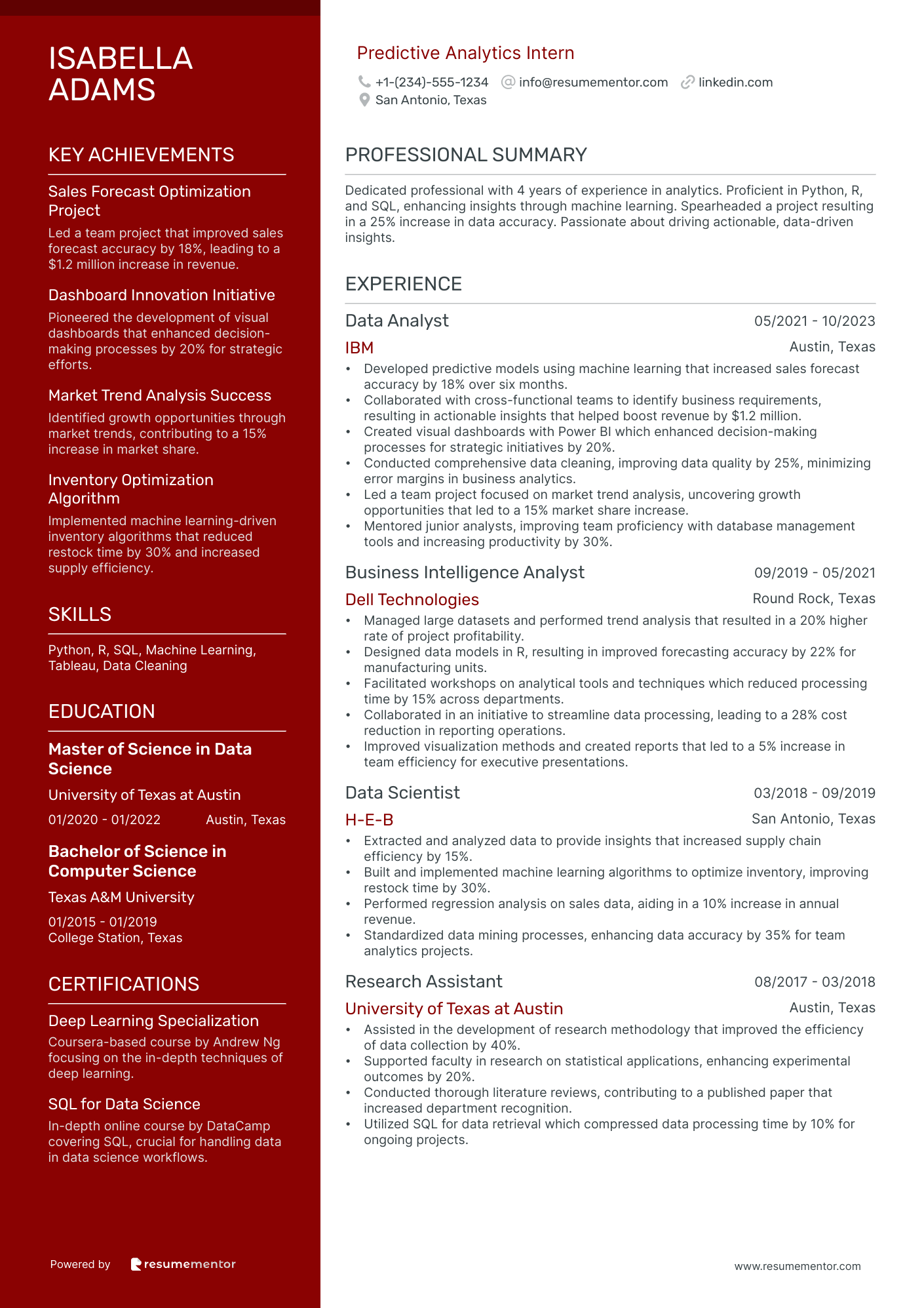
Predictive Analytics Intern
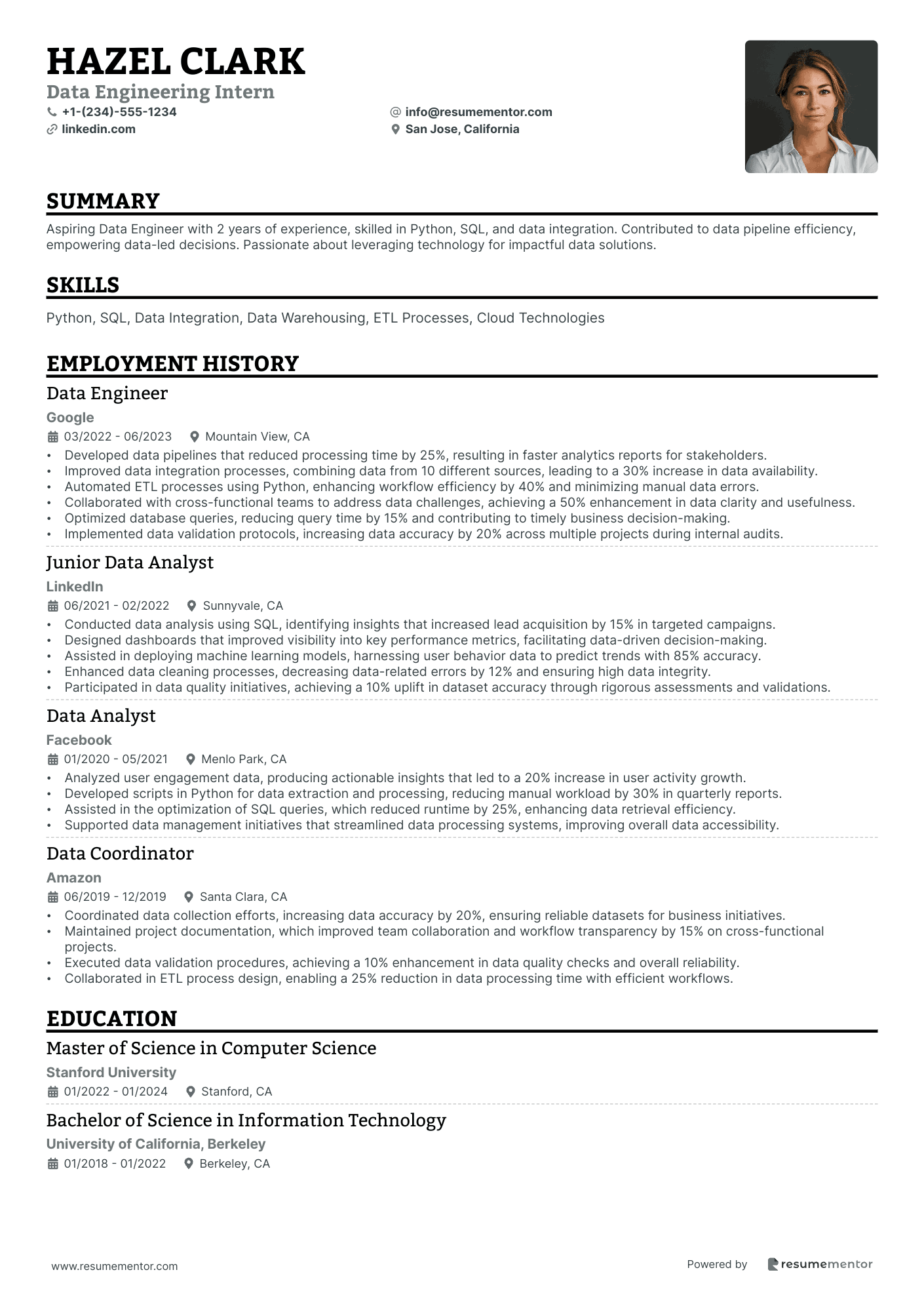
Data Engineering Intern
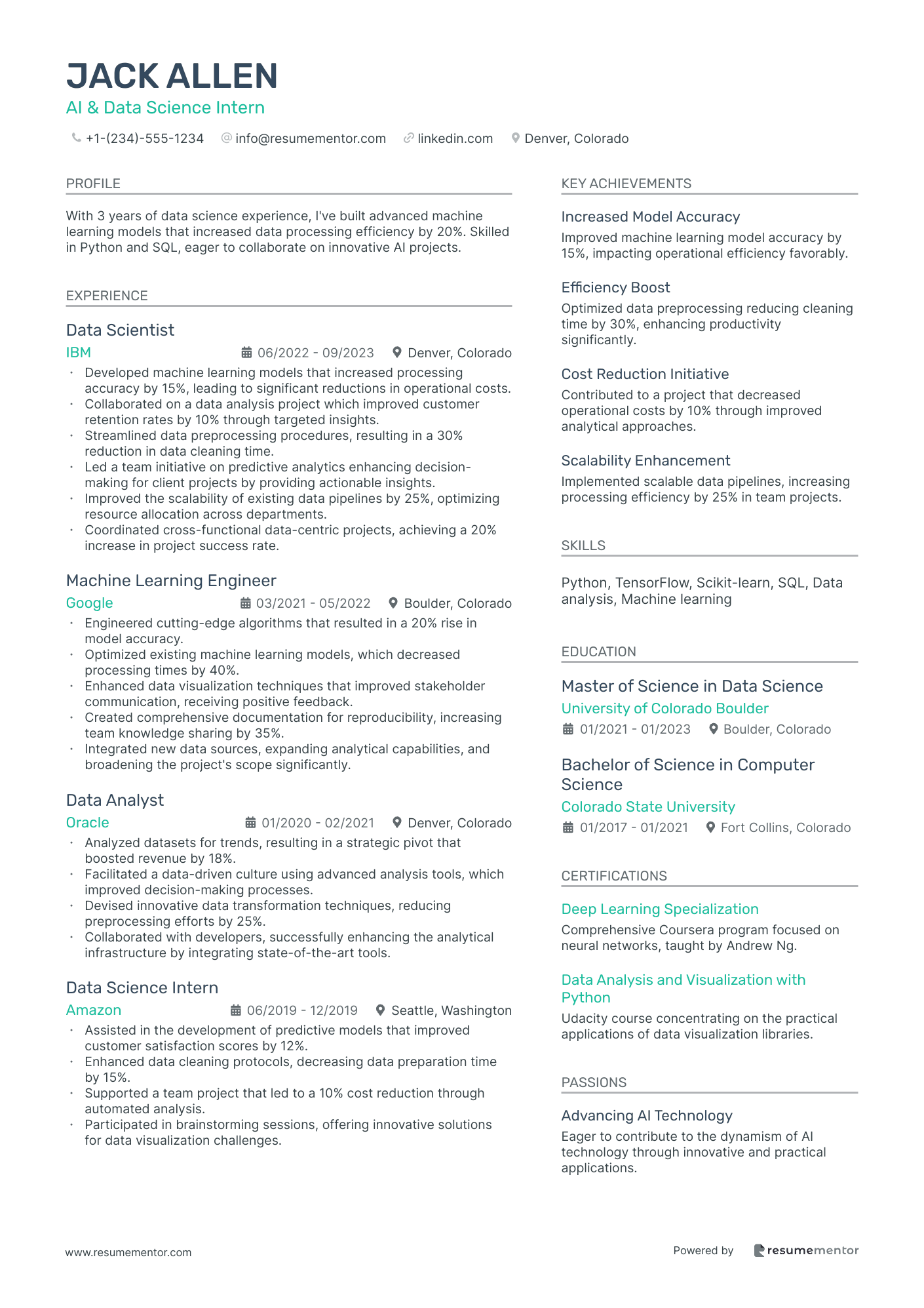
AI & Data Science Intern
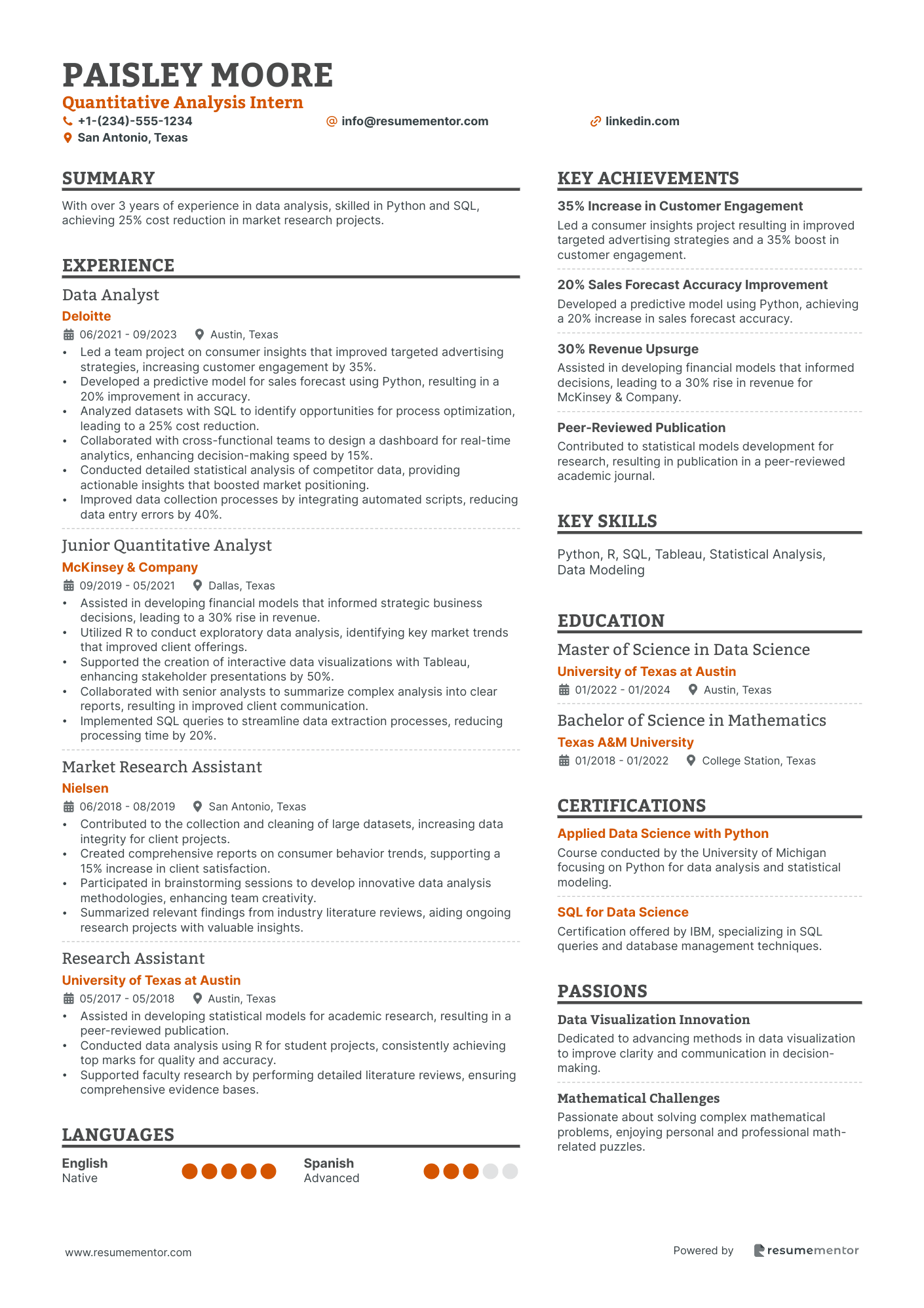
Quantitative Analysis Intern
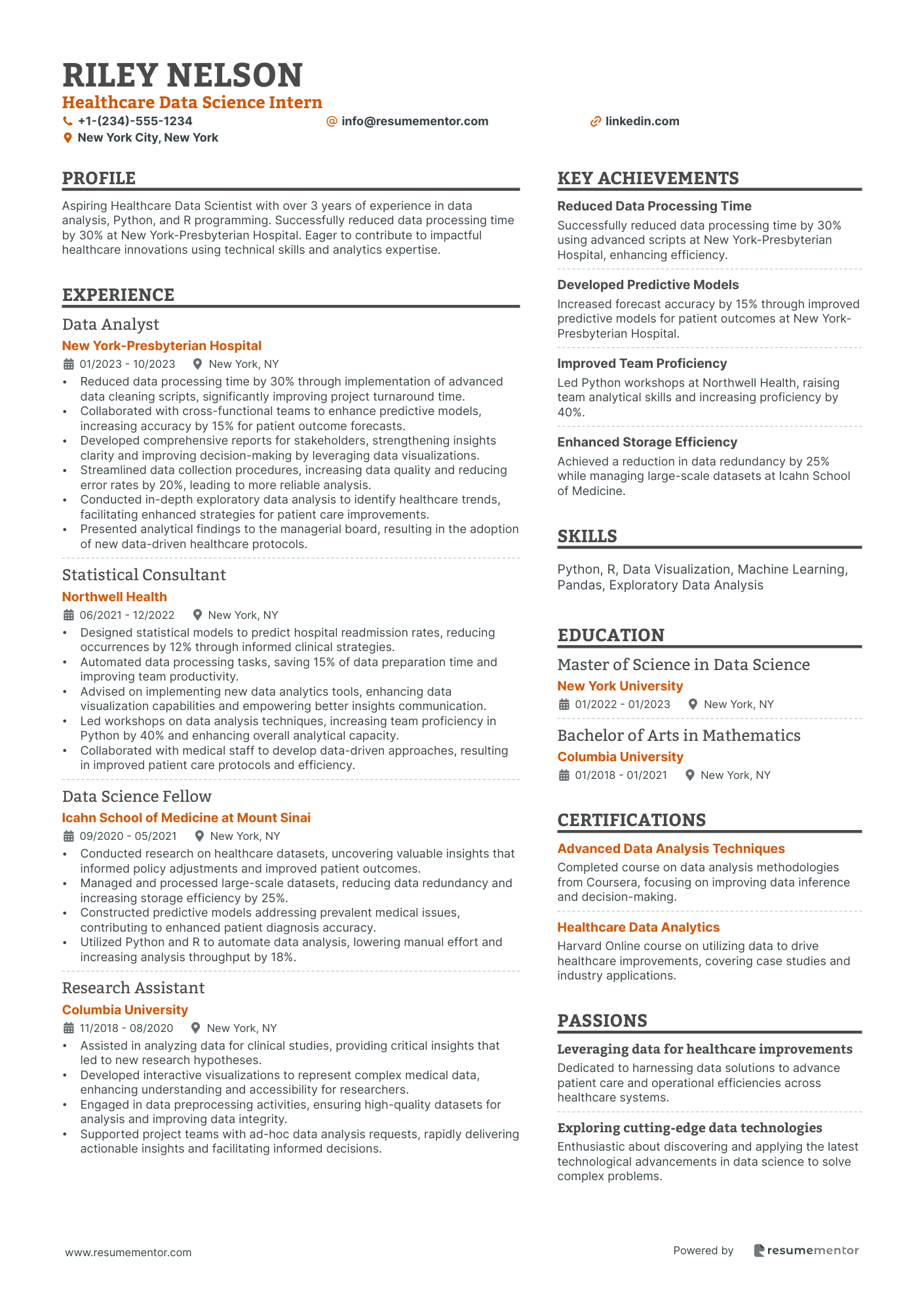
Healthcare Data Science Intern

Business Intelligence Internship resume sample
- •Improved the accuracy of business insights by implementing advanced analytics techniques resulting in a 25% increase in decision-making quality.
- •Collaborated with cross-functional teams, delivering customized data visualization solutions that increased user engagement by 40%.
- •Streamlined data gathering and cleaning processes, reducing processing time by 30% and boosting productivity.
- •Participated in weekly strategy meetings, contributing innovative ideas that enhanced the overall approach to business intelligence.
- •Developed a training module for non-technical staff, increasing their confidence and ability to use data by 50%.
- •Enhanced dashboard efficiency leading to faster report generation, reducing completion time by approximately 20 minutes per report.
- •Analyzed market trends and presented key findings, influencing a strategic decision that resulted in a 15% increase in market share.
- •Developed dashboards using Tableau, enabling dynamic reporting and real-time data analysis for multiple business units.
- •Collaborated with the IT department to enhance data management systems, improving data accuracy by 10%.
- •Conducted quantitative and qualitative analyses of competitor activities, supporting competitive positioning strategies.
- •Led a project to integrate disparate data sources into a cohesive reporting platform, enhancing data visibility by 60%.
- •Designed interactive dashboards for client-facing operations, increasing data accessibility for stakeholders by 35%.
- •Utilized data visualization to identify and address customer churn issues, improving retention rates by 5%.
- •Provided technical expertise in SQL and Python, effectively processing large data sets and driving performance improvements.
- •Played a pivotal role in a cross-departmental data integration project, optimizing operational workflows.
- •Oversaw the development of comprehensive data analyses, which supported a major initiative to streamline customer service operations.
- •Identified key trends and created actionable business insights, facilitating a 10% growth in client engagement metrics.
- •Led training sessions on data visualization software, improving departmental expertise and efficiency significantly.
- •Worked on a team to standardize reporting processes, reducing turnaround times by 15% and improving output quality.
Data Visualization Intern resume sample
- •Developed and optimized interactive dashboards using Tableau, enhancing data access for 100+ stakeholders.
- •Led a project to automate data extraction processes, reducing manual work by 40%, resulting in increased efficiency.
- •Collaborated with cross-functional teams to understand visualization requirements, boosting project delivery success by 20%.
- •Trained 15 team members on data visualization techniques, elevating team skill level and increasing output quality.
- •Conducted in-depth data analysis, providing actionable insights that drove a 25% increase in customer retention.
- •Enhanced existing visual narratives to better communicate key business performance indicators to executive management.
- •Designed over 50 interactive visual reports using Power BI, contributing to business strategy planning.
- •Increased stakeholder engagement by 35% through improved visualization design, resulting in effective decision-making.
- •Streamlined data cleaning processes, resulting in a 15% improvement in data accuracy for visualizations.
- •Developed a comprehensive KPI dashboard that improved visibility of business metrics for 200 employees.
- •Worked closely with IT to ensure the seamless integration of new data sources into existing visualization platforms.
- •Coordinated the creation of automated dashboards, which saved 25 labor hours per month in reporting tasks.
- •Improved dashboard load times by 50% through effective data organization and performance optimization techniques.
- •Executed a successful data migration project, ensuring data integrity and continuity in visualization systems.
- •Implemented new visualization strategies that highlighted core trends, enhancing executive insights.
- •Assisted in the creation of visual reports that increased user understanding by 20%.
- •Participated in user feedback sessions, refining dashboards based on end-user needs and feedback.
- •Helped design data presentation layouts that reduced complexity, improving user engagement metrics.
- •Conjoined extensive data sets to produce dynamic visual representations, enhancing project outcomes.
Big Data Intern resume sample
- •Led a project analyzing customer behavior data, improving retention rates by 15% through refined targeted marketing strategies.
- •Optimized data pipeline processes, reducing processing time by 30% and increasing overall system efficiency.
- •Collaborated with cross-functional teams to design predictive models that enhanced operational decision-making, resulting in 20% cost reduction.
- •Developed and maintained dynamic dashboards for real-time analytics, helping executives make data-driven decisions.
- •Managed and cleaned datasets from multiple sources, enabling seamless integration and analysis across platforms.
- •Investigated data inconsistencies and implemented solutions to ensure accurate reporting and business insights.
- •Conducted exploratory data analysis to identify trends and opportunities, increasing sales effectiveness by 25%.
- •Automated data collection processes, enhancing data accuracy and reducing manual entry errors by 35%.
- •Partnered with developers to implement scalable data systems, supporting business growth and data integrity.
- •Utilized Tableau for data visualization, generating user-friendly reports that enhanced strategic business planning.
- •Provided data-driven recommendations that streamlined supply chain operations, reducing costs by 18%.
- •Assisted in the development of a data lake, integrating over 50 disparate data sources for enhanced accessibility.
- •Contributed to improving data processing speeds by 40% through optimized ETL workflows and pipeline enhancements.
- •Worked closely with clients to customize data solutions, increasing satisfaction and client retention by 10%.
- •Created detailed user guides for non-technical teams, improving data accessibility and literacy across departments.
- •Supported database management tasks ensuring high data quality for enhanced business operations.
- •Executed daily data extraction and reporting tasks, maintaining consistent data availability for business users.
- •Participated in a project that resulted in a 30% improvement in data processing efficiency and reliability.
- •Facilitated training sessions on data management best practices, leading to increased team proficiency in handling data tools.
Predictive Analytics Intern resume sample
- •Developed predictive models using machine learning that increased sales forecast accuracy by 18% over six months.
- •Collaborated with cross-functional teams to identify business requirements, resulting in actionable insights that helped boost revenue by $1.2 million.
- •Created visual dashboards with Power BI which enhanced decision-making processes for strategic initiatives by 20%.
- •Conducted comprehensive data cleaning, improving data quality by 25%, minimizing error margins in business analytics.
- •Led a team project focused on market trend analysis, uncovering growth opportunities that led to a 15% market share increase.
- •Mentored junior analysts, improving team proficiency with database management tools and increasing productivity by 30%.
- •Managed large datasets and performed trend analysis that resulted in a 20% higher rate of project profitability.
- •Designed data models in R, resulting in improved forecasting accuracy by 22% for manufacturing units.
- •Facilitated workshops on analytical tools and techniques which reduced processing time by 15% across departments.
- •Collaborated in an initiative to streamline data processing, leading to a 28% cost reduction in reporting operations.
- •Improved visualization methods and created reports that led to a 5% increase in team efficiency for executive presentations.
- •Extracted and analyzed data to provide insights that increased supply chain efficiency by 15%.
- •Built and implemented machine learning algorithms to optimize inventory, improving restock time by 30%.
- •Performed regression analysis on sales data, aiding in a 10% increase in annual revenue.
- •Standardized data mining processes, enhancing data accuracy by 35% for team analytics projects.
- •Assisted in the development of research methodology that improved the efficiency of data collection by 40%.
- •Supported faculty in research on statistical applications, enhancing experimental outcomes by 20%.
- •Conducted thorough literature reviews, contributing to a published paper that increased department recognition.
- •Utilized SQL for data retrieval which compressed data processing time by 10% for ongoing projects.
Data Engineering Intern resume sample
- •Developed data pipelines that reduced processing time by 25%, resulting in faster analytics reports for stakeholders.
- •Improved data integration processes, combining data from 10 different sources, leading to a 30% increase in data availability.
- •Automated ETL processes using Python, enhancing workflow efficiency by 40% and minimizing manual data errors.
- •Collaborated with cross-functional teams to address data challenges, achieving a 50% enhancement in data clarity and usefulness.
- •Optimized database queries, reducing query time by 15% and contributing to timely business decision-making.
- •Implemented data validation protocols, increasing data accuracy by 20% across multiple projects during internal audits.
- •Conducted data analysis using SQL, identifying insights that increased lead acquisition by 15% in targeted campaigns.
- •Designed dashboards that improved visibility into key performance metrics, facilitating data-driven decision-making.
- •Assisted in deploying machine learning models, harnessing user behavior data to predict trends with 85% accuracy.
- •Enhanced data cleaning processes, decreasing data-related errors by 12% and ensuring high data integrity.
- •Participated in data quality initiatives, achieving a 10% uplift in dataset accuracy through rigorous assessments and validations.
- •Analyzed user engagement data, producing actionable insights that led to a 20% increase in user activity growth.
- •Developed scripts in Python for data extraction and processing, reducing manual workload by 30% in quarterly reports.
- •Assisted in the optimization of SQL queries, which reduced runtime by 25%, enhancing data retrieval efficiency.
- •Supported data management initiatives that streamlined data processing systems, improving overall data accessibility.
- •Coordinated data collection efforts, increasing data accuracy by 20%, ensuring reliable datasets for business initiatives.
- •Maintained project documentation, which improved team collaboration and workflow transparency by 15% on cross-functional projects.
- •Executed data validation procedures, achieving a 10% enhancement in data quality checks and overall reliability.
- •Collaborated in ETL process design, enabling a 25% reduction in data processing time with efficient workflows.
AI & Data Science Intern resume sample
- •Developed machine learning models that increased processing accuracy by 15%, leading to significant reductions in operational costs.
- •Collaborated on a data analysis project which improved customer retention rates by 10% through targeted insights.
- •Streamlined data preprocessing procedures, resulting in a 30% reduction in data cleaning time.
- •Led a team initiative on predictive analytics enhancing decision-making for client projects by providing actionable insights.
- •Improved the scalability of existing data pipelines by 25%, optimizing resource allocation across departments.
- •Coordinated cross-functional data-centric projects, achieving a 20% increase in project success rate.
- •Engineered cutting-edge algorithms that resulted in a 20% rise in model accuracy.
- •Optimized existing machine learning models, which decreased processing times by 40%.
- •Enhanced data visualization techniques that improved stakeholder communication, receiving positive feedback.
- •Created comprehensive documentation for reproducibility, increasing team knowledge sharing by 35%.
- •Integrated new data sources, expanding analytical capabilities, and broadening the project's scope significantly.
- •Analyzed datasets for trends, resulting in a strategic pivot that boosted revenue by 18%.
- •Facilitated a data-driven culture using advanced analysis tools, which improved decision-making processes.
- •Devised innovative data transformation techniques, reducing preprocessing efforts by 25%.
- •Collaborated with developers, successfully enhancing the analytical infrastructure by integrating state-of-the-art tools.
- •Assisted in the development of predictive models that improved customer satisfaction scores by 12%.
- •Enhanced data cleaning protocols, decreasing data preparation time by 15%.
- •Supported a team project that led to a 10% cost reduction through automated analysis.
- •Participated in brainstorming sessions, offering innovative solutions for data visualization challenges.
Quantitative Analysis Intern resume sample
- •Led a team project on consumer insights that improved targeted advertising strategies, increasing customer engagement by 35%.
- •Developed a predictive model for sales forecast using Python, resulting in a 20% improvement in accuracy.
- •Analyzed datasets with SQL to identify opportunities for process optimization, leading to a 25% cost reduction.
- •Collaborated with cross-functional teams to design a dashboard for real-time analytics, enhancing decision-making speed by 15%.
- •Conducted detailed statistical analysis of competitor data, providing actionable insights that boosted market positioning.
- •Improved data collection processes by integrating automated scripts, reducing data entry errors by 40%.
- •Assisted in developing financial models that informed strategic business decisions, leading to a 30% rise in revenue.
- •Utilized R to conduct exploratory data analysis, identifying key market trends that improved client offerings.
- •Supported the creation of interactive data visualizations with Tableau, enhancing stakeholder presentations by 50%.
- •Collaborated with senior analysts to summarize complex analysis into clear reports, resulting in improved client communication.
- •Implemented SQL queries to streamline data extraction processes, reducing processing time by 20%.
- •Contributed to the collection and cleaning of large datasets, increasing data integrity for client projects.
- •Created comprehensive reports on consumer behavior trends, supporting a 15% increase in client satisfaction.
- •Participated in brainstorming sessions to develop innovative data analysis methodologies, enhancing team creativity.
- •Summarized relevant findings from industry literature reviews, aiding ongoing research projects with valuable insights.
- •Assisted in developing statistical models for academic research, resulting in a peer-reviewed publication.
- •Conducted data analysis using R for student projects, consistently achieving top marks for quality and accuracy.
- •Supported faculty research by performing detailed literature reviews, ensuring comprehensive evidence bases.
Healthcare Data Science Intern resume sample
- •Reduced data processing time by 30% through implementation of advanced data cleaning scripts, significantly improving project turnaround time.
- •Collaborated with cross-functional teams to enhance predictive models, increasing accuracy by 15% for patient outcome forecasts.
- •Developed comprehensive reports for stakeholders, strengthening insights clarity and improving decision-making by leveraging data visualizations.
- •Streamlined data collection procedures, increasing data quality and reducing error rates by 20%, leading to more reliable analysis.
- •Conducted in-depth exploratory data analysis to identify healthcare trends, facilitating enhanced strategies for patient care improvements.
- •Presented analytical findings to the managerial board, resulting in the adoption of new data-driven healthcare protocols.
- •Designed statistical models to predict hospital readmission rates, reducing occurrences by 12% through informed clinical strategies.
- •Automated data processing tasks, saving 15% of data preparation time and improving team productivity.
- •Advised on implementing new data analytics tools, enhancing data visualization capabilities and empowering better insights communication.
- •Led workshops on data analysis techniques, increasing team proficiency in Python by 40% and enhancing overall analytical capacity.
- •Collaborated with medical staff to develop data-driven approaches, resulting in improved patient care protocols and efficiency.
- •Conducted research on healthcare datasets, uncovering valuable insights that informed policy adjustments and improved patient outcomes.
- •Managed and processed large-scale datasets, reducing data redundancy and increasing storage efficiency by 25%.
- •Constructed predictive models addressing prevalent medical issues, contributing to enhanced patient diagnosis accuracy.
- •Utilized Python and R to automate data analysis, lowering manual effort and increasing analysis throughput by 18%.
- •Assisted in analyzing data for clinical studies, providing critical insights that led to new research hypotheses.
- •Developed interactive visualizations to represent complex medical data, enhancing understanding and accessibility for researchers.
- •Engaged in data preprocessing activities, ensuring high-quality datasets for analysis and improving data integrity.
- •Supported project teams with ad-hoc data analysis requests, rapidly delivering actionable insights and facilitating informed decisions.
Crafting the perfect resume can feel like tackling a complex algorithm, especially as a data science intern entering the tech world. As you try to translate your coding skills, statistical knowledge, and analytical expertise into a compelling one-page document, it can get daunting amidst coursework and project deadlines. Fortunately, there's a clear path to guide your efforts.
By effectively framing your achievements and skills, you can significantly boost your chances of landing interviews. A well-structured resume not only highlights your strengths but also serves as a personal script, leading you confidently through the job application maze. Using a resume template is a smart strategy to streamline this process, saving you time and reducing stress.
Choosing the right template lays the foundation for showcasing your data processing capabilities and problem-solving prowess. As you explore various resume templates, you can find one tailored to fit your style and professional needs. The goal is to align your resume with both the internship position and your career aspirations, ensuring every section and word tells your story effectively.
Remember, your resume acts as your digital handshake, crafting a first impression before you even meet your potential employers. With thoughtful preparation and deliberate choices, your resume can not only catch the eye but also open doors to exciting opportunities in the tech industry.
Key Takeaways
- Writing a data science intern resume requires effectively framing technical skills, education, and hands-on project experience to align with both the internship role and career goals.
- Utilizing a clear and thoughtful resume template can save time and reduce stress, ensuring the strengths and achievements are well-highlighted.
- The chronological resume format is effective in organizing academic achievements and internships, while fonts like Rubik or Montserrat offer a contemporary look.
- A strong experience section should use action-oriented bullet points that highlight quantifiable achievements and precise impacts made in previous roles.
- The skills section should include both hard technical skills like Python and SQL, and essential soft skills such as analytical thinking and communication, to appeal to potential employers.
What to focus on when writing your data science intern resume
A data science intern resume should communicate your technical skills, analytical abilities, and eagerness to grow in this exciting field. It's important to show recruiters how you can contribute to data-driven projects while showcasing your passion for data analysis. To achieve this, your resume needs to reflect your education, highlight your relevant skills, and showcase any hands-on experience with data tools.
How to structure your data science intern resume
- Contact Information — Start with your full name, phone number, email address, and LinkedIn profile. This section should be concise yet comprehensive enough to allow employers to reach you easily. Ensure your email remains professional to make a positive first impression, as this sets the stage for your entire application.
- Objective Statement — In just a sentence or two, convey your aspirations as a data science intern and highlight your eagerness to apply your skills in real-world settings. This space is your first opportunity to let your enthusiasm shine through, so be clear and direct about your career goals and how you envision contributing to the company’s objectives.
- Education — Clearly list your current degree and university, including relevant coursework such as machine learning, statistics, or data visualization. Highlighting these areas demonstrates your academic foundation and preparedness for the challenges of a data science role. Mentioning any distinctions or special projects can further reinforce your aptitude for this field.
- Technical Skills — It's crucial to spotlight specific programming languages like Python or R, as well as data analysis tools and any familiar machine learning libraries. Your technical skills define your ability to perform in this role, so select terms that align with industry standards. This section reflects your expertise and your readiness to tackle data-driven challenges.
- Projects — Share examples of hands-on projects where you've applied data science techniques, demonstrating your ability to tackle real-world problems and extract meaningful insights. Projects can range from academic assignments to personal endeavors and showcase your ability to apply theory to practice within the field of data science.
- Experience — Include any previous work or internships, focusing on data-related tasks. Highlight activities that required problem-solving and teamwork experiences, illustrating your collaborative skills and adaptability in professional environments. Your experience section is the narrative of your career journey thus far and underscores your applied skills and learning.
As we transition to discussing resume format, these focused insights will provide a solid foundation for creating each section of your resume with depth and relevance. Below, we'll cover each section more in-depth to ensure your resume effectively communicates your potential as a data science intern.
Which resume format to choose
Crafting a standout resume for a data science intern position starts by selecting a format that effectively tells your career story. The chronological format is especially suitable because it organizes your academic achievements and any relevant internships or projects in a way that highlights your growth and readiness for the role.
Fonts play a significant role in how your resume is perceived. Choosing modern fonts like Rubik, Lato, or Montserrat can give your resume a contemporary and polished look. These fonts are easy to read and convey a sense of professionalism that aligns well with the tech-savvy nature of a data science role.
File type is a critical consideration when sending out your resume. PDFs are your best bet because they preserve your layout and design exactly as intended, ensuring that potential employers see your resume just as you created it. This consistency can help maintain a professional image.
Finally, ensuring proper layout with one-inch margins on all sides keeps your resume clean and easy to navigate. This spacing provides a comfortable reading experience, allowing employers to focus on your skills and experiences without being distracted by cluttered text.
Each of these elements—from format to file type—works together to create a cohesive, professional resume that effectively showcases your qualifications for a data science internship. By paying attention to these details, you enhance your chance of making a strong impression.
How to write a quantifiable resume experience section
Crafting a stellar data science intern resume starts with a strong experience section. This part of your resume is your opportunity to highlight skills and accomplishments effectively. Focusing on structure and impact is crucial. A well-designed experience section illustrates your growth, achievements, and capabilities, connecting directly with potential employers by showcasing how you can solve their problems. Begin with your most recent experience in reverse-chronological order, tracing back about 10 years or to your earliest relevant job. Tailoring your resume to the specific job ad is essential, ensuring your job title aligns with the position you're applying for. Using dynamic action words like "analyzed," "developed," or "improved" gives your tasks power and clarity.
Tailoring your resume demonstrates attention to detail and genuine interest in the specific role. By mirroring the skills and tools mentioned in a job description with those you possess, your experience section resonates more with employers. Quantifiable achievements make your entries memorable. Numbers prove your impact and communicate your contributions effectively. Highlights like boosting efficiency by 20% or developing a model with 95% accuracy draw hiring managers' attention.
- •Analyzed customer data using Python, increasing customer retention by 15%.
- •Developed a predictive model with an accuracy of 92%, aiding marketing strategies.
- •Implemented data visualization dashboards in Tableau, reducing reporting time by 30%.
- •Collaborated on a cross-functional team to improve data pipeline efficiency by 25%.
This experience section truly stands out by merging specific achievements with measurable outcomes. The action-oriented bullet points efficiently convey the role and impact you had at Tech Solutions Inc. By aligning with expectations for data science positions, the section clearly illustrates your command of relevant technical skills like Python, Tableau, and predictive modeling. Each bullet points to a precise achievement—such as boosting customer retention and enhancing marketing strategies—using clear percentages that grab potential employers' attention.
What adds to its strength is the tailored approach, which underscores how your skills directly contributed to the organization’s success. It seamlessly guides the reader from task description to impact, maintaining a professional tone throughout. This section not only communicates what you accomplished but also details why it mattered, making you a compelling candidate by emphasizing both technical expertise and collaborative abilities essential for data science roles.
Project-Focused resume experience section
A project-focused data science intern resume experience section should highlight the practical skills and achievements you gained from working on real-world projects. Begin by selecting the most impactful projects you completed during your internship or academic career. Clearly name each project and detail your role and the outcomes achieved, which allows employers to assess your capability to apply theoretical knowledge in practical scenarios.
To create a seamless narrative, use action verbs and specific results to vividly describe your experiences, demonstrating your technical proficiency. Mention the tools and technologies, such as Python or SQL, to showcase your expertise. As you describe the challenges faced, explain how you overcame them, effectively exhibiting your problem-solving abilities. Finally, connect your individual contributions to the overarching goals of the project or company to highlight the significance of your work.
Data Science Intern
Tech Innovators Inc.
June 2022 - August 2022
- Developed a predictive model using Python and scikit-learn that improved sales forecasting accuracy by 15%.
- Collaborated with a team of 4 interns to clean and analyze a dataset of over 500,000 rows, identifying key trends and insights.
- Created data visualizations using Tableau to present findings to management, enhancing decision-making processes.
- Improved data processing speed by optimizing SQL queries, reducing runtime by 30%.
Achievement-Focused resume experience section
A data science-focused intern resume experience section should clearly showcase your contributions and their impact. Start by pinpointing the critical projects or tasks you tackled during your internship and focus on the results, metrics of success, and any enhancements in workflows or data processes. By using strong action verbs and quantifying your achievements, you demonstrate how effectively you leveraged data to achieve concrete outcomes.
When crafting each bullet point, make sure it ties your actions to the results. For example, if you developed a new tool, explain how it enhanced efficiency or accuracy, illustrating your ability to apply technical knowledge practically. Each point should paint a picture of the value you bring, helping employers understand the practical skills you offer in real-world settings.
Data Science Intern
Tech Corp
June 2023 - August 2023
- Analyzed customer data to spot trends, which boosted customer engagement by 15%.
- Created a machine learning model that cut data processing time by 30%.
- Worked with a team of 5 to revamp the data pipeline, boosting throughput by 40%.
- Shared analysis findings with senior management, leading to a new marketing strategy.
Skills-Focused resume experience section
A skills-focused data science intern resume experience section should clearly demonstrate how your abilities contributed to past roles. Begin by noting your role, the company you worked with, and the duration of your experience. This sets the stage for detailing how you applied key data science skills to drive success. Describe tangible achievements, such as programming efficiency, data visualization impacts, or statistical analysis results, to illustrate your expertise. Craft each bullet point with action verbs to show the effect of your work and emphasize your contributions in measurable ways, which employers value in a data-driven field.
To make each bullet point more compelling, highlight where you applied critical technical skills like Python, R, or SQL. Connect these skills to experiences where you gathered data, derived insights, or influenced business decisions. Discuss team collaborations that solved complex problems and projects that required machine learning algorithms or data manipulation. This cohesive storytelling allows potential employers to quickly grasp your strengths and envision the value you could bring to their team.
Data Science Intern
Tech Innovations Inc.
June 2023 - August 2023
- Analyzed large datasets using Python to offer insights that boosted project outcomes by 15%.
- Worked with a team of five to build data visualization dashboards with Tableau.
- Cleaned and organized data, which cut down processing time by 40%.
- Helped develop predictive models that improved forecast accuracy by 10%.
Leadership-Focused resume experience section
A leadership-focused data science intern resume experience section should effectively highlight the moments where you've taken initiative and demonstrated leadership capabilities, even in smaller scopes. Begin by mentioning the duration of each role to convey your commitment. Use active language to describe your actions, focusing on teamwork, problem-solving, and leadership qualities. Each point should reflect specific achievements and illustrate how these contributions positively impacted the company or team goals.
It's essential to keep your points concise and centered on leadership or initiative, such as guiding a team through a project or translating complex data insights for colleagues who aren't technically inclined. A well-crafted section will showcase more than your technical skills, emphasizing your ability to inspire others, make decisions, and enhance group efficiency or morale. Maintain clarity and impact by ensuring each entry focuses on a particular trait or accomplishment.
Data Science Intern
Innovative Tech Co.
June 2022 - August 2022
- Led a team of 4 interns to develop a predictive model, boosting project efficiency by 20%.
- Facilitated weekly meetings to ensure team alignment and address concerns, enhancing morale and collaboration.
- Explained complex data findings to non-technical stakeholders, leading to the adoption of new data-driven strategies.
- Organized a code review workshop that improved coding standards and reduced errors by 15%.
Write your data science intern resume summary section
A data science-focused resume summary should quickly capture your skills, experience, and passion, setting the stage for the rest of your resume. In just a few sentences, it's your opportunity to convey why you're the best fit for the role. Here’s an example:
This summary works well as it ties together skills and tools crucial to data science, highlights relevant coursework, and provides a tangible project result, showcasing your capabilities and impact. Describing yourself effectively in a resume summary means focusing on qualities and skills that align with the job you're applying for. Action words and including results you've achieved can make your experience stand out.
Understanding the differences between a resume summary and other similar sections can help you choose the right approach. While a resume summary highlights past experiences and what you bring to your next role, a resume objective focuses on your career ambitions, ideal for entry-level candidates. A resume profile gives a broad overview of your abilities, suitable for displaying a wide range of skills. Meanwhile, a summary of qualifications emphasizes your top accomplishments, perfect for those with more experience. Crafting a clear, concise resume summary or objective helps ensure that you make a strong impression from the outset.
Listing your data science intern skills on your resume
A data science-focused intern resume should strategically highlight your skills in a way that showcases your expertise and potential. The skills section is a key part of this, serving either as a standalone section or integrated into your experience and summary areas. By showcasing your strengths and soft skills, you demonstrate personal qualities like teamwork and problem-solving. Hard skills, however, are your technical abilities, like coding and data analysis, that you’ve mastered. These skills and strengths act as critical keywords, making sure your resume is noticeable to employers and making an impression on application systems.
Here’s a JSON example of a focused skills section:
This skills section works effectively because it concisely lists high-demand skills relevant to data science internships. By keeping the entries clear and targeted, it quickly communicates to employers that you are well-equipped for the role.
Best hard skills to feature on your data science intern resume
Highlighting your hard skills is crucial as they demonstrate your technical capabilities. As a data science intern, these skills show you can handle data analysis and related tasks. Some important hard skills to include are:
Hard Skills
- Python programming
- R programming
- SQL querying
- Data visualization tools (Tableau, Power BI)
- Machine learning algorithms
- Statistical analysis
- Data cleaning and preprocessing
- Big data tools (Hadoop, Spark)
- Natural language processing
- Deep learning frameworks (TensorFlow, PyTorch)
- Excel proficiency
- Time series analysis
- Data mining techniques
- Predictive modeling
- Probability theory
Best soft skills to feature on your data science intern resume
Equally important are soft skills, as they reflect your collaborative and problem-solving abilities. In a data science role, these skills show employers you can work well with others and adapt to challenges. Key soft skills to feature are:
Soft Skills
- Analytical thinking
- Communication skills
- Team collaboration
- Problem-solving
- Attention to detail
- Adaptability
- Creativity
- Time management
- Initiative
- Critical thinking
- Presentation skills
- Interpersonal skills
- Resilience
- Organization
- Empathy
How to include your education on your resume
The education section is a vital part of your data science intern resume. It showcases your academic background and helps potential employers see the foundation you've built for the role you're applying to. Tailor this section to match the job you're eyeing. Exclude irrelevant educational details that don't add value to your application. When listing a degree, include the full title of your qualification, the name of the institution, and any significant achievement like cum laude. If your GPA is above 3.0, consider adding it to reflect academic excellence.
Here’s how it’s done incorrectly:
Here’s an outstanding example:
- •Graduated cum laude
The second example stands out because it directly relates to a data science job. It highlights a relevant degree and a strong GPA of 3.9/4.0. Cum laude is another impressive detail that can attract employers. The example omits unnecessary information like location when it’s not needed.
In Conclusion
In conclusion, building a strong resume as a data science intern is a strategic process that blends showcasing your technical skills with projecting your passion for data-driven insights. Your resume is more than a mere list of experiences; it's a snapshot of your potential contributions to prospective employers. Keeping this document concise yet comprehensive will enhance your chances of standing out. Emphasize your hands-on projects, relevant technical skills, and problem-solving abilities to paint a vivid picture of your capabilities. Remember to tailor your resume to the specific requirements of the role you are applying for, ensuring your achievements align with the company's needs. The use of a clean, professional format with readable fonts and appropriate file type ensures your document is both visually appealing and easy to access. Furthermore, a clear resume summary can set the stage for your application, effectively communicating your readiness and enthusiasm for the role. By focusing on quantifiable results and clearly articulated experiences, you make a strong case for your employability in the competitive field of data science. This approach, balanced with a well-crafted educational background and thoughtful skill list, forms the cornerstone of an effective data science intern resume. As you progress in your career, these foundations will serve you well, providing a clear narrative of your growth and readiness for future challenges.
Related Articles

Continue Reading
Check more recommended readings to get the job of your dreams.
Resume
Resources
Tools
© 2026. All rights reserved.
Made with love by people who care.

